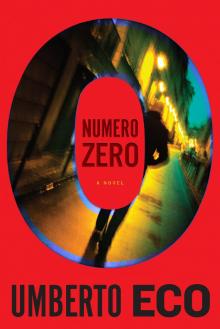- Home
- Umberto Eco
How to Travel With a Salmon & Other Essays Page 3
How to Travel With a Salmon & Other Essays Read online
Page 3
The train, in America, is not a choice. It is a punishment for, having neglected to read Weber on the Protestant ethic and the spirit of capitalism, making the mistake of remaining poor. But liberals are politically correct no matter what, and the conductors are extremely polite even with the dirtiest dropout (naturally I should say "victim of marginalization"). In Pennsylvania Station there are many "non-travelers" wandering around, casting glazed looks at their neighbors' luggage. But the controversy about police brutality in Los Angeles is still in the air, and New York is a PC city. The Irish cop approaches the presumed bum, smiles, and asks him how he happens to be in the neighborhood. The bum appeals to the Rights of Man, and the cop, remarking angelically that it's a lovely day outside, goes off, dangling (not swinging) his long nightstick.
Among the poor, too, there are those who cannot manage to abandon the ultimate symbol of marginalization: they smoke. If you try to climb into the one smoking car, you suddenly find yourself in the Dreigroschenoper. I was the only one wearing a tie. For the rest, catatonic freaks, sleeping tramps snoring with their mouths open, comatose zombies. As the smoker was the last car of the train, on arrival, this collection of outcasts had to walk a hundred yards or so, slouching along the platform like Jerry Lewis.
Having escaped from this railway hell and changed into uncontaminated clothes, I found myself having supper in the private dining room of a faculty club, among well-dressed professors with educated accents. At the end, I asked if there was somewhere I could go and smoke. A moment of silence and embarrassed smiles followed, then someone closed the doors, a lady extracted a pack of cigarettes from her purse, others looked at my own pack. Furtive glances of complicity, stifled laughter, as in a striptease theater. There followed ten minutes of delightful, thrilling transgression. I was Lucifer, arrived from the world of shadows, and I illuminated everyone with the blazing torch of sin.
1991
How to Take Intelligent Vacations
It has become a familiar custom, as summer vacation time approaches, for the political and literary weeklies to recommend at least ten "intelligent" books that will enable their readers to spend their "intelligent" vacations intelligently. But thanks to a persistent and unpleasant habit of considering the reader underprivileged and ill-read, some quite celebrated writers take great pains to suggest reading matter that any person of average culture should have read in high school, if not before. It seems to us, if not offensive, at least condescending to insult the reader by advising him to look into, say, the original German edition of the Elective Affinities, the Pléiade Proust, or Petrarch's Latin works. We must bear in mind that, bombarded by so much advice over such a long time, the reader has become more and more demanding; and we must bear in mind those who, unable to afford luxury vacations, are game to venture into experiences as uncomfortable as they are thrilling.
For vacationers who will be spending long hours on the beach I would recommend the Ars magna lucis et umbrae of Athanasius Kircher, fascinating for anyone who, lying under the infrared solar rays, wants to reflect on the wonders of light and mirrors. The Roman edition of 1645 can still be acquired through antiquarians for sums undoubtedly inferior to those that our former political leaders exported into Switzerland. I do not advise trying to borrow this book from a library, because it is found only in ancient palaces where the attendants are so elderly that they tend to fall off the ladders leading to the rare-book shelves. Additional drawbacks are the size of the book and the friability of the paper: not to be read on days when the wind is blowing over beach umbrellas.
A young person, on the other hand, one who is journeying around the continent on a Eurailpass, and who must therefore read in those overcrowded passages where you have to stand with one arm out of the window, could take with him at least three of the six Einaudi volumes of Ramusio's travels, to be read holding one volume in hand, another under an arm, the third clutched between the thighs. Reading about journeys while on a journey is an intensely stimulating experience.
For young people who are recovering from (or disappointed by) political activity, but are still anxious to keep an eye on the problems of the Third World, I would suggest some little masterpiece of Muslim wisdom. Adelphi has recently published The Book of Advice by Kay Ka'us ibn Iskandar, but unfortunately without the original Iranian; the translation does not convey the flavor of the text. I would suggest instead the delightful ( Kitāb) al-Sa'ādah wa-al-is'ād by Abū al-Hasan al-'Amirī, available in Teheran in the critical edition of 1957.
But not every reader is fluent in Middle Eastern languages, of course. For the patristically-oriented motorist, less burdened by constraints on bulk or weight of luggage, the complete collection of Migne's Patrologia is always an excellent choice. I would advise against the Greek Fathers before the Council of Florence of 1440, which would require packing both the 160 volumes of the Greco-Latin edition and the 81 of the Latin edition, whereas the Latin Fathers prior to 1216 are squeezed into 218 volumes. I am well aware that not all of these are readily available on the market, but the reader can always fall back on photocopies. For those with less specialized interests I would suggest selected works (in the original, naturally) from the cabalistic tradition (essential today for anyone who wants to understand contemporary poetry). A few volumes are enough: a copy of the Sefer Yezirah, the Zohar, of course, and then Moses Cordovero and Isaac Luria. The cabalistic corpus is particularly suited to holidays, because original editions of the oldest works can still be found in scroll editions, easily stowed in hitchhikers' backpacks. The cabalistic corpus is also perfectly suited to the Clubs Mediterranés, where the animators can organize a Cabala Competition, the prize to be awarded the team constructing the most attractive golem. Finally, for those whose Hebrew is rusty, there is always the Corpus Hermeticum and the gnostic writings (Valentinus is best; Basil is not infrequently prolix and irritating).
All this (and much more) will make for an intelligent vacation. Or, if you want to make things simple, just take with you the Grundrisse, the apocryphal Gospels, and microfiches of the unpublished works of Peirce. Or, if you resist intellectual stimulation, stick with Agatha.
1981
How to Use the Taxi Driver
The minute you take your seat in a taxi the problem of appropriate interaction with the driver arises. The taxi driver is someone who spends all day driving in city traffic (an activity that provokes either heart attack or delirium), in constant conflict with other human drivers. Consequently, he is nervous and hates every anthropomorphic creature. This attitude leads members of the radical chic to say that all taxi drivers are fascists. Not true. The taxi driver has no interest in ideological problems: he hates trade union demonstrations, not for their political orientation, but rather because they block traffic. He would hate a parade of Daughters of the Duce just as much. All he wants is a strong government that will send all private car owners to the gallows and establish a reasonable, but strict curfew—between 6 A.M. and midnight, say. He is a misogynist, but only as regards women who move about. If they stay home and cook pasta, he can tolerate them.
Italian taxi drivers can be divided into three categories: those who express these opinions throughout the course of the ride; those who are silent and communicate their misanthropy through their driving; and those who work off their tensions in pure narration, describing what happened to them with this or that fare. These tranches de vie lack any allegorical significance, and if they were told in a tavern the bartender would feel obliged to send the narrator home, saying it was time to go to bed. But to the taxi driver these tales seem odd and surprising, and you would be wise to comment on them with frequent interjections on the order of "It's a crazy world! There're a lot of flakes out there! You mean they really said that?!" This participation does not budge the driver from his fabulatory autism, but it enhances your own self-esteem.
An Italian visiting New York runs some risks if, after reading on the driver's ID a name like De Cu-tugnatto, Esippositto, Perquocco, he
reveals his own nationality. The driver invariably begins speaking a non-existent language, taking deep offense if you don't understand it. You must then immediately say, in English, that you speak only the dialect of your native region. For that matter, he is convinced that in Italy, nowadays, the national language is English. But, generally speaking, New York taxi drivers have either a Jewish name or a non-Jewish name. Those with Jewish names are Zionist reactionaries, those with non-Jewish names are anti-Semitic reactionaries. In either case, they do not make assertions, only pronunciamentos. It is hard to know how to behave with those who have a vaguely Middle Eastern or Russian name, as you can't figure out whether they are Jewish or not. To avoid accidents you must then say you have changed your mind and, instead of the corner of Seventh and Fourteenth, you want to go to Charlton Street. The driver will then have a tantrum, slam on the brakes, and make you get out, because New York drivers know only the streets with numbers and not those with names.
Paris taxi drivers, on the other hand, do not know any streets at all. If you ask one to take you to Place Saint-Sulpice, he'll let you off at the Odéon, saying that's the closest he can get. But first he will have moaned at length over your overweening demands with some cries of "Ah, ^a, monsieur, alors...."If you venture to suggest he consult a guidebook, he either does not reply or suggests that if you wanted bibliographical information you should have consulted an archivist-paleographer at the Sorbonne. Asians are a category apart: with extreme politeness they tell you not to worry, they'll find the place at once, and three times they make the circuit of the boulevards; then they ask what's the difference if, instead of taking you to the Gare du Nord, they've brought you to the Gare de l'Est—after all, there are plenty of trains at both stations.
In New York, as far as I can tell, you can't summon a taxi by telephone to some club; in Paris you can; but they don't come. In Stockholm you can call them only by phone, because they don't trust any old stranger walking along the street. But to discover what phone number to call, you would have to stop a passing taxi, and, as I just said, the drivers don't trust anybody.
German drivers are courteous and correct. They don't speak, they just press the accelerator. When you get out, white as a sheet, you realize why they come to Italy for relaxation and drive in front of you, doing sixty kilometers per hour in the fast lane.
If you set a Frankfurt driver in his Porsche to compete with a Rio driver in his battered Volkswagen, the Rio driver would arrive first, partly because he doesn't stop at traffic lights. If he did, he would see another battered Volkswagen pull up beside him, full with boys just waiting to reach out and snatch his passenger's wristwatch.
In any part of the world there is one sure way of recognizing a taxi driver: he is that person who never has any change.
1988
How Not to Talk about Soccer
I have nothing against soccer. I don't go to stadiums, for the same reason that I wouldn't go and spend the night in the basement of the Main Railroad Station in Milan (or stroll in Central Park in New York after six in the afternoon), but if the occasion arises I watch a good game on TV with interest and pleasure, because I recognize and appreciate all the merits of this noble sport. I don't hate soccer. I hate soccer fans.
Please don't misunderstand me. My feelings towards fans are exactly those that xenophobes of the Lombard League feel towards immigrants from the Third World. "I'm not a racist, so long as they stay home." By "home" here I mean both the places where they like to gather during the week (bars, living rooms, clubs) and the stadiums, where I am not interested in what happens. And for me it's a plus if the Liverpool fans arrive, because then I can amuse myself reading the news reports: if we must have cir-censes, some blood at least should be spilled.
I don't like the soccer fan, because he has a strange defect: he cannot understand why you are not a fan yourself, and he insists on talking to you as if you were. To convey my meaning I will give you an analogy. I play the recorder (worse and worse, according to a public statement by Luciano Berio, but to be followed so closely by a Great Master is a satisfaction). Now let's suppose that I am in a train compartment and, to strike up a conversation, I ask the gentleman sitting opposite me, "Have you heard Frans Brüggen's latest CD?"
"What? Eh?"
"I'm talking about the Pavane Lacbryme. If you ask me, he takes the opening bars too slowly."
"I'm afraid I don't understand."
"I'm talking about Van Eyck, of course, [slowly and distinctly] The Blockflöte."
"Look, I'm not.... Do you play it with a bow?"
"Oh, I understand, you aren't—"
"No."
"That's funny. Did you know that, for a custom-made Coolsma, there's a three-year waiting list? So an ebony Moeck is better. It's the best, at least of those on the market. Galway says the same thing. Tell me something: do you go as far as the fifth variation of Derdre Doen Daphne D'Over?"
"Actually, I'm getting off at Parma."
"Oh, I see. You prefer to play in F rather than in C. It's more satisfying in some ways, I know. Mind you, I've discovered a sonata by Loeillet that—"
"Lay who?"
"But I'd like to hear you in the Fantasias of Tele-mann. Can you manage them? Don't tell me you use the German fingering?"
"Look, when it comes to the Germans, I.... Granted, the BMW is a great car, and I respect them, but—"
"I get it. You use the baroque fingering. Right. Though the St. Martin's-in-the-Fields bunch—"
There. You understand my point, I'm sure. And you will sympathize with my hapless traveling companion if he pulls the alarm cord. But the same thing happens with the soccer fan. And the situation is particularly difficult when the fan is also your taxi driver.
"So what about Vialli, eh?"
"I must have missed that."
"But you're going to watch the game tonight, aren't you?"
"No, I have to work on Book Z of the Metaphysics, you know? The Stagirite."
"Okay. You watch it and you'll see if I'm right or not. I say Van Basten might be the new Maradona. What do you think? But I'd keep an eye on Aldaiz, all the same."
And so on and on. Like talking to a wall. It isn't that he doesn't care a fig that / don't care a fig. It's that he can't conceive that anyone could exist and not care a fig. He wouldn't understand it even if I had three eyes and a pair of antennae emerging from the green scales of my nape. He has no notion of the diversity, the variety, the incomparability of the various possible worlds.
I have used the taxi driver as an example, but the situation is the same when the interlocutor belongs to the managerial class. It's like ulcers: they strike rich and poor alike. It is curious, however, that creatures so adamantine in their conviction that all humans are the same are ready to bash in the head of the fan who comes from the neighboring province. This ecumenical chauvinism wrings roars of admiration from me. It's as if the members of the Lombard League were to say: "Suffer the Africans to come unto us. So we can kick their ass."
1990
How to Use the Coffeepot from Hell
There are several ways to prepare good coffee. There is the caffè alla napoletana, the caffè espresso, café turque, cafesinho do Brasil, French café-filtre, American coffee. Each coffee, in its own way, is excellent. American coffee can be a pale solution served at a temperature of 100 degrees centigrade in plastic thermos cups, usually obligatory in railroad stations for purposes of genocide, whereas coffee made with an American percolator, such as you find in private houses or in humble luncheonettes, served with eggs and bacon, is delicious, fragrant, goes down like pure spring water, and afterwards causes severe palpitations, because one cup contains more caffeine than four espressos.
Swill-coffee is something apart. It is usually made from rotten barley, dead men's bones, plus a few genuine coffee beans fished out of the garbage bins of a Celtic dispensary. It is easily recognized by its unmistakable odor of feet marinated in dishwater. It is served in prisons, reform schools, sleeping
cars, and luxury hotels. Of course, if you stay at the Plaza Majestic, at the Maria Jolanda & Brabante, at the Des Alpes et Des Bains, you can actually order an espresso, but when it arrives in your room it is almost covered by a sheet of ice. To avoid this mishap you ask instead for the Continental Breakfast, and you lie back, prepared to savor the pleasure of having the day's first meal in bed.
The Continental Breakfast consists of two rolls, one croissant, orange juice (in homeopathic measure), a curl of butter, a little pot of blueberry preserve, another of honey, and one of apricot jam, a jug of milk, now cold, a bill totaling a hundred thousand lire, and a devilish pot full of swill. The pots used by normal people—or the good old coffee makers from which you pour the fragrant beverage directly into the cup—allow the coffee to descend through a narrow nozzle or beak, whereas the upper part includes some safety device that keeps the lid closed. The Grand Hotel and wagon-lit swill arrives in a pot with a very wide beak—like a deformed pelican's—and with an extremely mobile lid, so devised that—drawn by an irrepressible horror vacui—it slides automatically downwards when the pot is tilted. These two devices allow the hellish pot to pour half the coffee immediately onto the rolls and jam and then, thanks to the sliding lid, to scatter the rest over the sheets. In sleeping cars the pots can be of cheaper manufacture, because the movement of the train itself assists in the scattering of the coffee; in hotels, on the other hand, the pot must be of china to make the sliding of the lid easier, but still devastating.
As to the origin and purpose of the coffeepot from hell, there are two schools of thought. The school of Freiburg asserts that this device allows the hotel to demonstrate, with fresh sheets, that your bed has been duly re-made. The school of Bratislava insists that the motivation is moralistic (cf. Max Weber, The Protestant Ethic and the Spirit of Catholicism): the hellish coffeepot prevents any lazing in bed because it is very uncomfortable to eat a brioche, already steeped in coffee, when you are wrapped in coffee-soaked sheets.

 Baudolino
Baudolino The Name of the Rose
The Name of the Rose Chronicles of a Liquid Society
Chronicles of a Liquid Society Inventing the Enemy: Essays
Inventing the Enemy: Essays Foucault's Pendulum
Foucault's Pendulum How to Travel With a Salmon & Other Essays
How to Travel With a Salmon & Other Essays Numero zero
Numero zero The Island of the Day Before
The Island of the Day Before UMBERTO ECO : THE PRAGUE CEMETERY
UMBERTO ECO : THE PRAGUE CEMETERY On the Shoulders of Giants
On the Shoulders of Giants Misreadings
Misreadings Six Walks in the Fictional Woods
Six Walks in the Fictional Woods The Mysterious Flame Of Queen Loana
The Mysterious Flame Of Queen Loana The Prague Cemetery
The Prague Cemetery On Literature
On Literature Lost structure
Lost structure